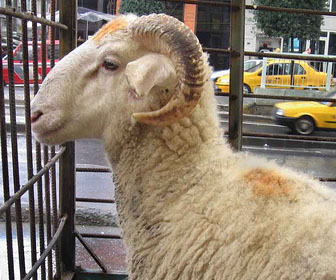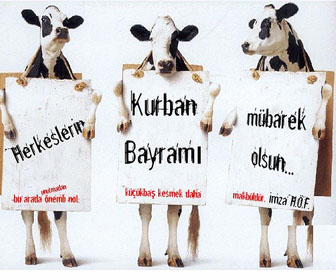 |
 |
| |
|
| |
The Muslim Festival of Sacrifices

|
| |
 |

|
|
| |
|
|
|
| |
Ei al-Adha, the Festival of Sacrifice celebrated by all Muslims,
concludes the pilgrimage to Mecca. The pilgrimage is the last of the
Five Pillars of Islam. Each Pillar represents a certain duty. These
duties are Shahada (Profession of Faith), Salah (Prayers), Zakat
(Giving of Alms), Sawm (Fasting during Ramadan) and Hajj (Pilgrimage
to Mecca).
One of a Muslim's duties is to take part in the pilgrimage to Mecca
in Saudi Arabia. However, those who are either in poor health or
can't afford to travel are excused from the obligation.
Ei al-Adha is not just celebrated by those who are on the
pilgrimage, but by all Muslims. The purpose of the celebration is to
remember the prophet Ibrahim's willingness to sacrifice his own son
when Allah ordered him to do so.
Allah appeared to Ibrahim in a dream telling him to sacrifice his
son, Isma'il. The father and son set off to Mina to follow through
with Allah's command.
As Ibrahim prepared to kill his son, Allah saw that he was obedient
and loyal to him above all else and stopped him. He gave him a sheep
to sacrifice instead.
Every year, Muslims celebrate Ibrahim's complete submission to Allah
with The Festival of Sacrifices. During the festival, animals such
as cows, rams and sheep are sacrificed. The family eats about
one-third of the meat, donating the rest to the poor.
The Festival of Sacrifices begins with a short prayer, followed by
Khutba (a sermon); the same sermon which is performed during the
midday prayer in the mosque every Friday. The Khutba symbolizes
one's willingness to give up some boundaries, in order to help those
less fortunate.
It is a common misconception that the sacrifice itself has to do
with atoning for sins or that using the blood washes away sins. "It
is not their meat nor their blood that reaches Allah; it is your
piety that reaches him." (Qur'an 22:37)
|
|
| |
|
|
| |
|
<-Back
|
|
|
 |
|
